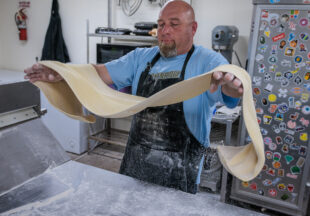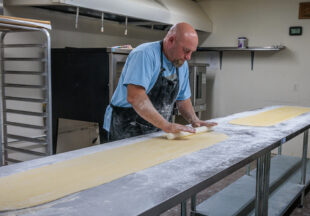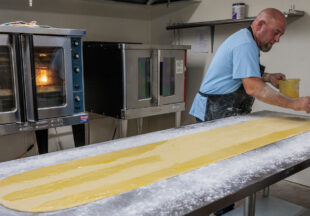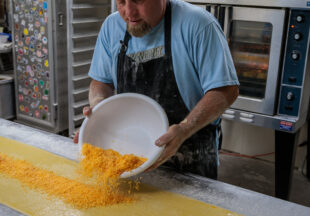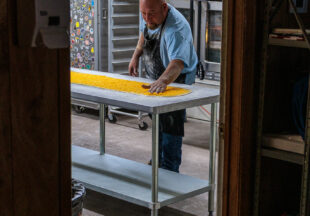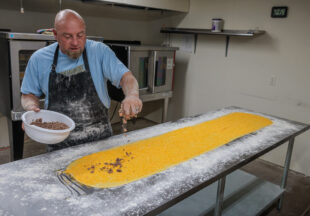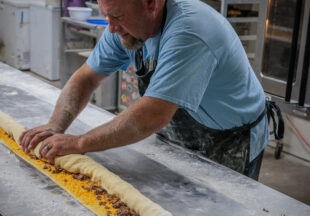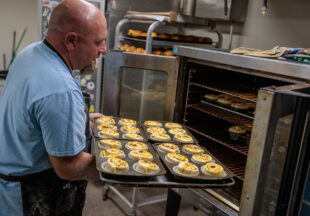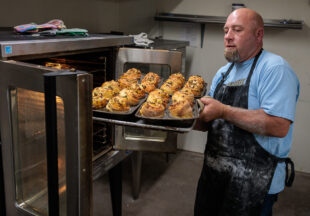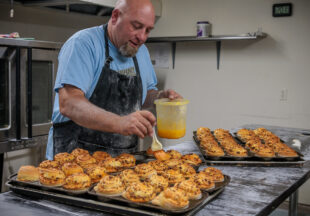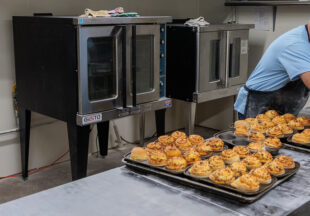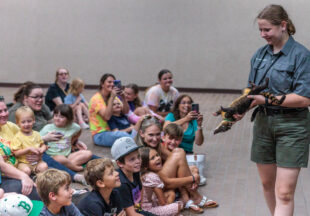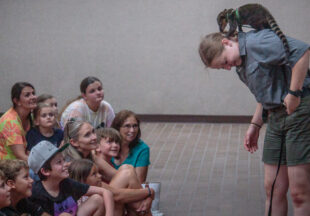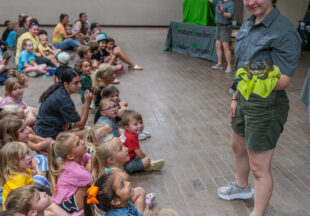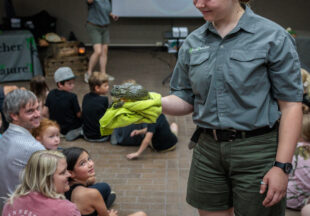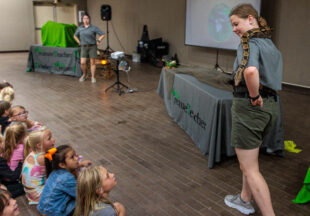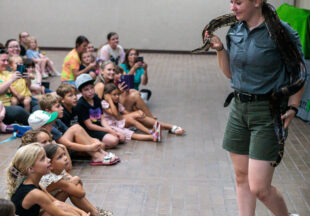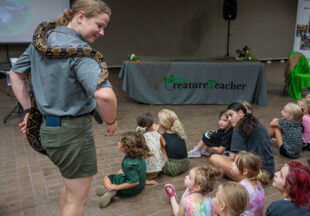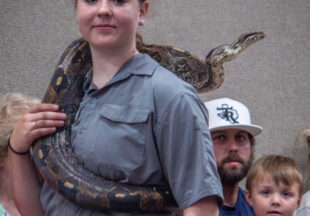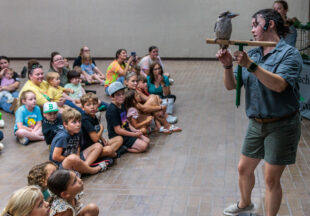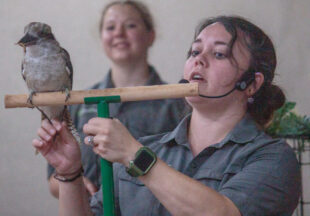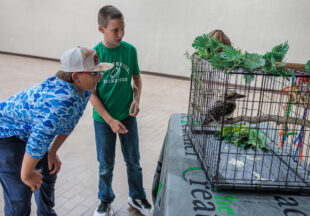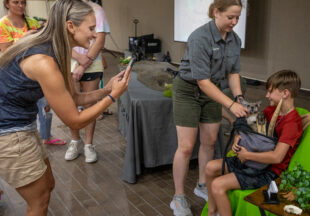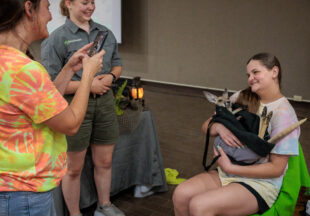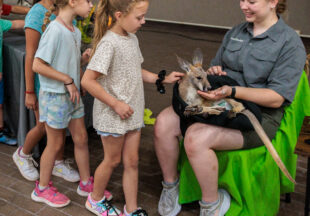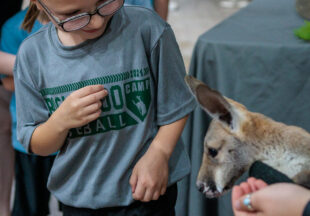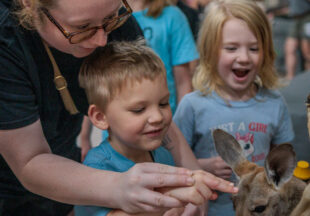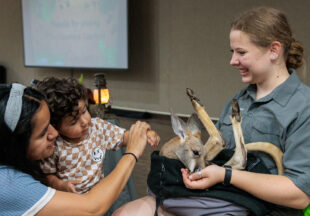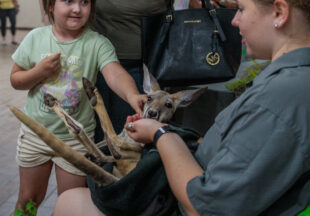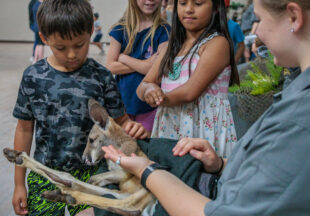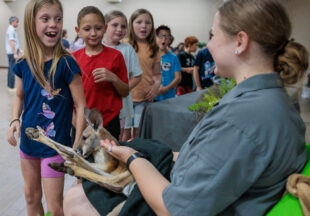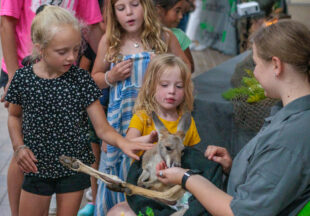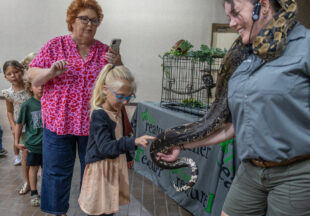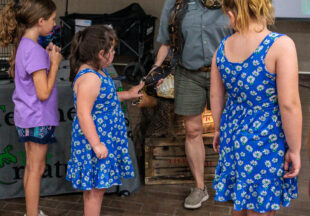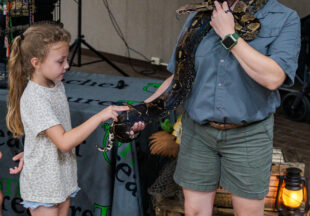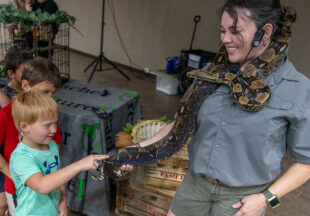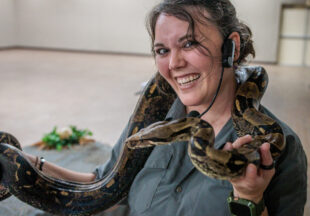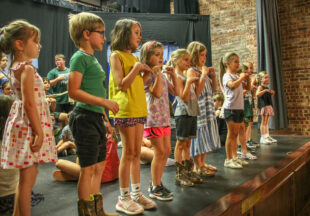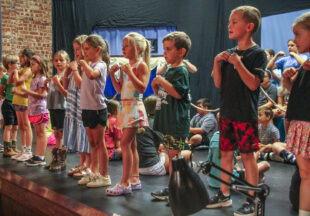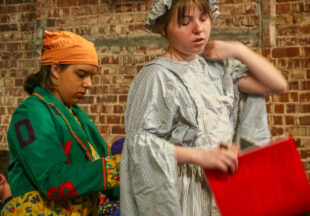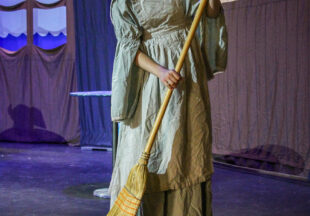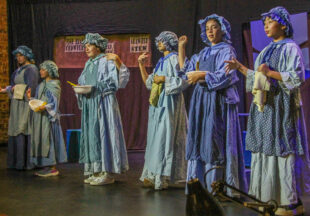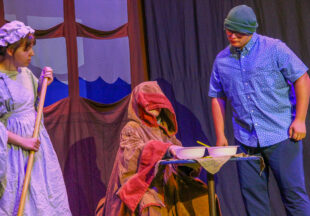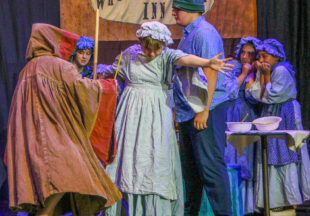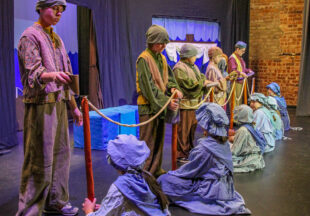BHS seniors participate in ‘Welcome to the Real World’ program

By Carla McKeown/Breckenridge Texan
Breckenridge High School seniors got a little taste of reality earlier this month when they participated in the “Welcome to the Real World” program, which is designed to teach high school students the skills they need to financially navigate the adult world.
The program, which was sponsored by Texas A&M AgriLife Extension and InterBank in partnership with the high school, took place in the BHS auxiliary gym.

Carrol Kanady with InterBank talks to BHS seniors during the “Welcome to the Real World” program about the costs of having children. (Photo by Tony Pilkington/Breckenridge Texan)
This was the second year for the Real World program at BHS, and Stephens County Extension Agent Sumer Russell said there were a few changes this year. The salaries and some prices were updated, due to inflation. Locally, the program is based on a rural community, regarding careers, cost of living, etc. Also helping with the program was Jessie Shortes, Stephens County’s AgriLife Extension ag agent.
“I was surprised by how much they enjoyed the program and how much they learned,” Russell said about last year’s Real World experience. “A lot of the students don’t realize that you have to pay for utilities and how expensive everything is. The feedback we received is that they thought this would help them with their future choices.”
At the beginning of the two-hour program, each participating student was randomly assigned an occupation with a specified monthly salary, as well as the amount they would have to pay in taxes and student loan. Then, they visited tables set up around the room, where they worked out their monthly budgets, based on their salaries and personal interests. At each table, a couple of advisers — community members, InterBank employees, local business representatives, etc. — helped them make the best choices.
The job spectrum included a variety of jobs with different levels of skills and education requirements. The occupations included coach, lab tech, plumber/pipefitter, janitor, nursing aide, insurance adjuster, police officer, and other professions. Additionally, there were some other random details for each student. For example, about 15 percent of the participants were designated to have a child that they were supporting. Some have college degrees.
After receiving their job and salary assignments, the students filled out a lifestyle survey that came in the packet of information they got. They had to make choices, such as whether they wanted to live on a farm, in a town (below 10,000 population), in a city (10,000-50,000), in the suburbs (over 50,000) or in a central city (over 100,000 population). Other choices included what type of home they want to live in, the type of vehicle they want to drive, the type of groceries they would like to buy, and what they want to do for entertainment.
Then, they visited the tables to start making decisions about how to spend and save their money. At the housing table, they could choose between living in a rented apartment or house or buying their own home. If their original choice was too expensive for their income, they could team up with a classmate as roommates and split the bills. If they chose to live at home with their parents, they were expected to contribute to the monthly expenses there.
At the transportation table, they decided what type of car they wanted to drive and worked out the payment plan for their choice. There were also tables for utilities, groceries and household expenses, entertainment, clothing, children, insurance and credit cards/financial advice.

Brian Kight, left, a 4-H leader, assists students at the Reality Wheel. Click here to see more photos from the event. (Photo by Tony Pilkington/Breckenridge Texan)
One of the stations was the Reality Wheel, which each student spun to see what life would send their way. The items on the wheel were real-life type situations that adults deal with every day, such as “You are invited to a wedding,” which had expenses attached to it. Other options were things like “You had a minor car accident — Pay the $250 deductible,” “You need a dental filling. With insurance, pay $75. Without insurance, pay $200.” and “A family member has a baby shower. Spend $50 on the gift.” There were also some beneficial options, such as “Your income tax refund check arrives. Add $120 into your savings account.”
The students who landed on an expense on the Reality Wheel often expressed their dismay at having to deduct the funds from their account. Brian Kight, who was the Reality Wheel table adviser, commiserated with them, reminding them that, “Life happens.”
Once they were finished with their choices, the students then had to see how their budgets held up. If they had spent more than they earned, they had to go back to the tables and make different choices. If they couldn’t figure it out on their own, the financial adviser table, staffed by InterBank employees, offered advice.
Along the way, they learned skills such as how to balance a budget and a bank account, how to write a check and how to write a thank you note.
After the students finished figuring out their budgets, Dr. Jason Johnson, a finance specialist with the AgriLife Extension Service, talked to them about what they need to be successful in life. He told the students that the key to earning a higher salary is to have “knowledge, skills and ability.”
Johnson also encouraged the students to continue educating themselves throughout their lives. “The minute you stop improving and increasing your abilities is the minute you become obsolete,” he said.
He also suggested that, in addition to a job that the students may work at, the students consider using their hobbies or other interests to create a second income via a “side hustle.”
Johnson’s ultimate advice to the students: “If you do this one thing, I promise you will become wealthy over time, and if you don’t do it, I promise you’ll never become wealthy. What is that one thing? Spend less than you bring in,” he said. “If you always stick aside 10 percent and pay yourself first and you manage that, either saving or investing, over time, I promise you, you will be better off.”

Dr. Jason Johnson, a finance specialist with the AgriLife Extension Service, talks to Breckenridge High School seniors about what they can do throughout their lives to become wealthy. (Photo by Tony Pilkington/Breckenridge Texan)
- Luke Grider- InterBank
- Carrol Kanady- InterBank
- Kristy Mackey- InterBank
- Molly Kinsley- InterBank
- Johnathon Rogers- InterBank
- Brad Bellah-InterBank
- Erin Gaton- InterBank
- Jerry Campbell- InterBank
- Allison Young- BISD
- Praire Freeman- BISD
- Marlie Easley- BISD
- Tucker Young-BISD
- Brian Kight- 4-H Adult Leader
- Sonja Morehart- PTO president/ 4-H Adult Leader president
- Kenneth Myers- Farm Bureau
- Dana Moser- Farm Bureau
- Rob Durham- Bayer Chevrolet
- Melinda Lane- Rotary Club
- Yuri Huntington – Chamber of Commerce
When Sean Speaks
Earlier this spring, the Extension Service hosted a program for local junior high students about the dangers of drunk driving.
Breckenridge Junior High School students had an opportunity to hear the message about the consequences of driving while under the influence of alcohol from someone who has experienced the effects such a bad decision. Sean Carter was a student at Midwestern State University majoring in Business Administration in 2005 when he got into a truck driven by a college friend who was drunk. As the truck spun and slammed into a tree, his journey into a new life began.

Sean Carter visited Breckenridge Junior High School earlier this spring to present a program, along with his mother, Jenny Carter, about the dangers of drunk driving. (Courtesy Photo)
In March, Carter’s journey brought him to Breckenridge when Stephens County Texas A&M Agrilife Extension Agent Sumer Russell partnered with BJHS to provide the “When Sean Speaks” program to the school’s 300 sixth, seventh and eighth graders. The When Sean Speaks organization is “dedicated to spreading the word that alcohol, automobiles and asphalt don’t mix. It is just as important to be careful of whose car you get into as a passenger,” according to the website.
Carter and his mom, Jenny Carter, have taken their message to tens of thousands of young people to help prevent drunk driving and to make people aware of the consequences of their choices, including the students at BJHS.
According to the website, Carter’s journey into his new life started at the crash site in Wichita Falls, during the early morning hours of Sunday, March 27, 2005. The car crash, left Carter with multiple fractures, internal injuries, and a traumatic brain injury. Although he forgot how to walk and talk, he continues to make progress and is well down the path of his new life.
He suffers no obvious cognitive deficits and has immediate rapport with everyone he meets, the website states. A digital tablet gives Carter a voice and a way to communicate with others.
Carter has been a member of the Texas Traumatic Brain Injury Advisory Council and has been on the Mentorship/Advisory Committee for the Texas EMS Trauma and Acute Care Foundation and represented the Survivors of Trauma.
WhenSeanSpeaks Inc, has been funded by a Texas Department of Transportation Grant awarded to Texas A&M University AgriLife’s Watch UR BAC program, since 2013.









